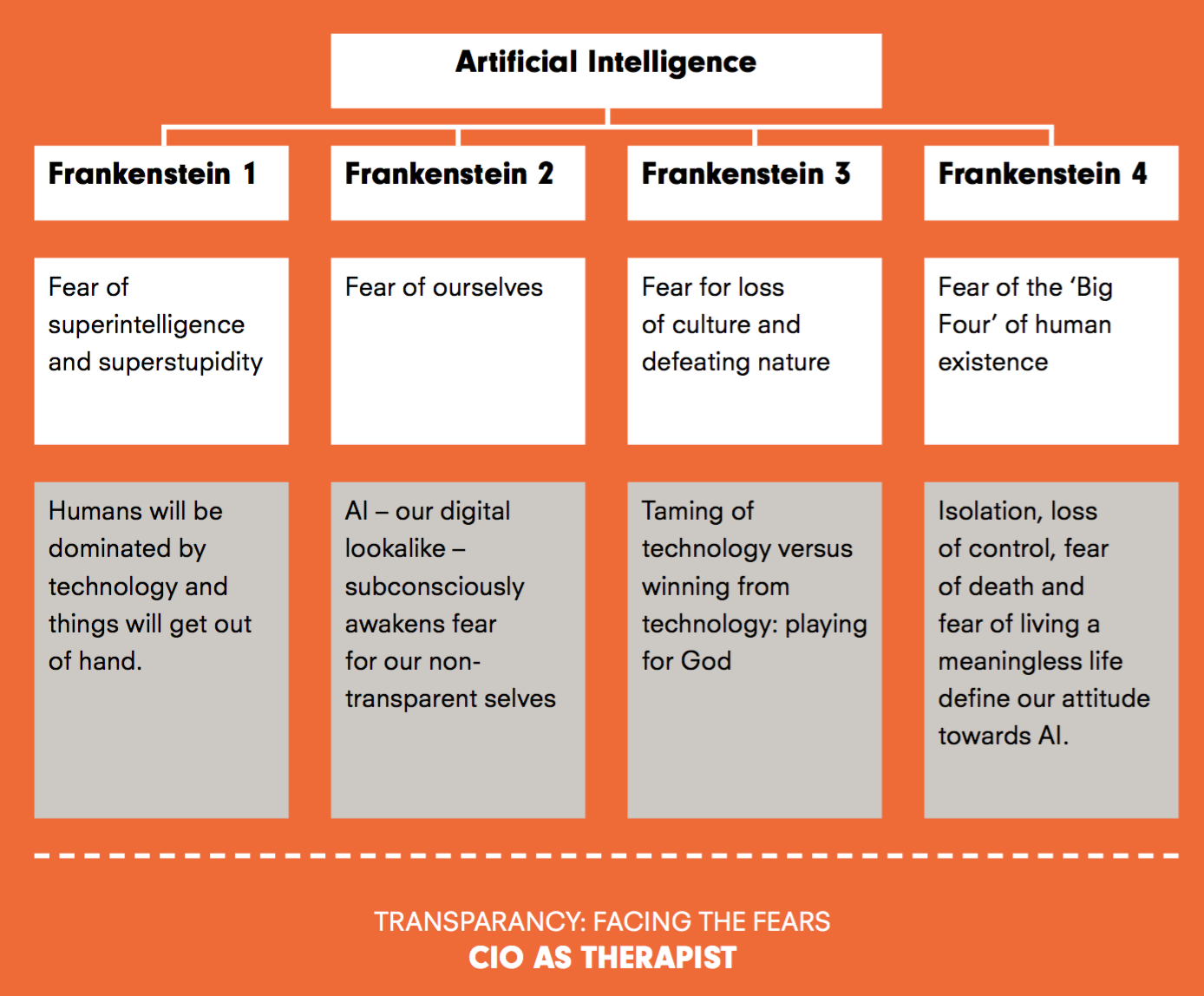The Frankenstein Factor in IT – Therapy needed for our AI Future
New report on Machine Intelligence by SogetiLabs addressing the fear of Artificial Intelligence and how organizations should handle it.
The Frankenstein Factor in IT – Therapy needed for our AI Future
New report on Machine Intelligence by SogetiLabs addressing the fear of Artificial Intelligence and how organizations should handle it.
Paris, France, 2 May, 2017 – We are on the threshold of an extraordinary development that makes the automation heart beat faster. Recent announcements by both Facebook and tech pioneer Elon Musk to build brain interfaces are great examples. But together with the expanding possibilities of Artificial Intelligence (AI), emotions run higher and higher. A new report from SogetiLabs 'The Frankenstein Factor: the Anatomy of Fear of AI' recommends taking these emotions seriously and pleads for a therapeutic approach. A focus on IT efficiency and effectiveness should be accompanied by a focus on human existence.
Taking fear seriously
The European Parliament adopted a non-binding resolution in February 2017, that seamlessly connects Mary Shelley's novel 'Frankenstein, or the Modern Prometheus' with the emergence of robots and smart algorithms. The resolution addresses, among other things, the dehumanization when caretaking robots take over human tasks. It proposes that robot engineers sign a code of conduct respecting the 'dignity, privacy and safety' of people. Members of the European Parliament fear artificial intelligence will ultimately affect the intrinsic European and humanistic values.
Menno van Doorn, Research Director of SogetiLabs:
"The important signal we send is that there is an advantage that can be gained if the emotional relationships are included in the AI plans of an organization. There are examples that simply placing a humanoid robot at a reception desk already causes great consternation. An action intended as an inspiring gimmick – go and play with a robot – may be misunderstood. Of the same category is the use of certain images of robots in a PowerPoint presentation that somehow come across as being creepy and steer the meeting in an unintended direction."
What would Elon do?
On April 19th Facebook announced it is going to build brain-computer interfaces that can turn thoughts into text. Three weeks earlier, tech pioneer Elon Musk said his new company Neuralink will directly link human minds to computers. Musk says this would permit both telepathy between people and advantageous relations with artificial intelligence.
"It is tempting to see Elon Musk as the modern Prometheus, the new Dr. Frankenstein. But we need to be aware of our basic instincts and how the Frankenstein Factor triggers fear. As already described by psychoanalysts Sigmund Freud and Ernst Jentsch, fear is automatically triggered when we are faced with Androids and Automata. Dealing with those Hollywood fears and our basic responses is one thing that CIO's need to learn to master," commented Menno van Doorn.
Organizations should ask themselves the question 'What would Elon do?' when they start working with AI. And what we learn from Elon Musk is that he is constantly present at both ends of the spectrum: discussing his fears and opening the debate, as some kind of therapy, and investing and learning as quick as he can as an entrepreneur.
Addressing questions such as “How do we make AI transparent to the end consumers?”, “How do we use AI to derive the best outcomes for end consumers?”, “How do we use AI to drive our desired business outcomes?”, will be key for organization moving forward.
The report describes four Frankenstein Factors that can be downloaded here: www.sogeti.com/mi3

A series of reports on Machine Intelligence
The Frankenstein Factor: the Anatomy of Fear of AI" is the third in a series of four qualitative research reports on the topic of Machine Intelligence. The series started with a first executive introduction to MI, followed by a second report about the combination of AI and messenger platforms, 'The Bot Effect: Friending a Brand'. The fourth and final report will be on the topic of Algorithmic Businesses. All Sogeti reports can be found at www.sogeti.com/reports.
For more information please contact:
Menno van Doorn, Director of Research/Trendwatcher, SogetiLabs
Tel: +31 6 51 27 09 85
Email: menno.van.doorn@sogeti.com
Therese Sinter, Global Communications Director, Sogeti
Phone: +46 70 361 46 21
Email: therese.sinter@sogeti.com
About Sogeti
Sogeti is a leading provider of technology and engineering services. Sogeti delivers solutions that enable digital transformation and offers cutting-edge expertise in Cloud, Cybersecurity, Digital Manufacturing, Quality Assurance & Testing, and emerging technologies. Sogeti combines agility and speed of implementation with strong technology supplier partnerships, world class methodologies and its global delivery model, Rightshore®. Sogeti brings together more than 25,000 professionals in 15 countries, based in over 100 locations in Europe, USA and India. Sogeti is a wholly-owned subsidiary of Cap Gemini S.A., listed on the Paris Stock Exchange. For more information please visit www.sogeti.com.
Rightshore® is a trademark belonging to Capgemini
About SogetiLabs
SogetiLabs is a network of over 120 technology leaders from Sogeti worldwide. SogetiLabs covers a wide range of digital technology expertise: from embedded software, cyber security, simulation, and cloud to business information management, mobile apps, analytics, testing, and the Internet of Things. The focus is always on leveraging technologies, systems and applications in actual business situations to maximize results. SogetiLabs provides insight, research, and inspiration through articles, presentations, and videos that can be downloaded via the extensive SogetiLabs presence on its website, online portals, and social media. For more information please visit http://labs.sogeti.com.
- Menno van DoornDirector of VINT
+31 6 51 27 09 85
 Menno van DoornDirector of VINT
Menno van DoornDirector of VINT
+31 6 51 27 09 85
- Therese SinterMarketing & Communications Director, Nordics
+46 70 361 46 21
 Therese SinterMarketing & Communications Director, Nordics
Therese SinterMarketing & Communications Director, Nordics
+46 70 361 46 21



![[Missing text '/pageicons/altmail' for 'English']](/Static/img/email.png)